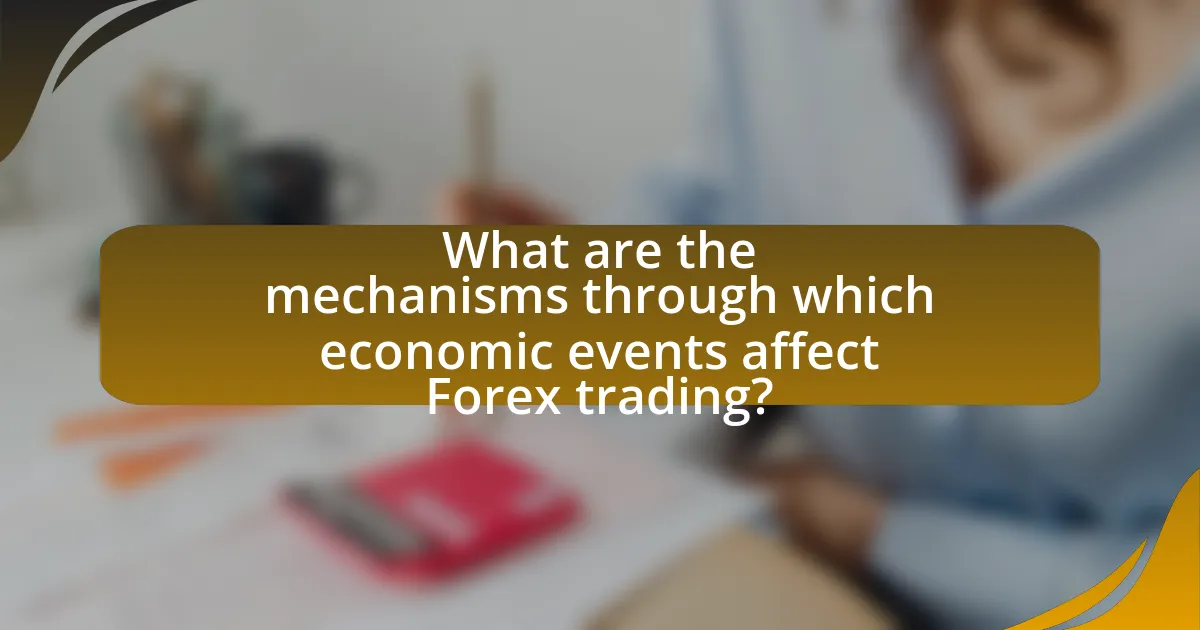Global economic events play a crucial role in shaping Forex trading dynamics by influencing currency values and trader sentiment. Key factors such as interest rate changes, inflation reports, employment data, and geopolitical tensions directly impact market volatility and currency fluctuations. Understanding these economic indicators is essential for traders to anticipate market movements and develop effective trading strategies. The article explores the mechanisms through which economic events affect Forex trading, the psychological factors influencing trader behavior, and best practices for navigating the market during periods of volatility.

How do global economic events influence Forex trading dynamics?
Global economic events significantly influence Forex trading dynamics by affecting currency values and trader sentiment. For instance, economic indicators such as GDP growth rates, unemployment figures, and inflation data can lead to fluctuations in currency exchange rates. When a country reports strong economic performance, its currency typically appreciates due to increased investor confidence, as seen in the U.S. dollar’s rise following positive employment reports. Conversely, geopolitical events like trade wars or political instability can lead to currency depreciation, as traders seek safer assets. Historical data shows that during the 2008 financial crisis, the volatility in Forex markets surged, reflecting the immediate impact of global economic uncertainty on currency trading.
What types of global economic events impact Forex markets?
Global economic events that impact Forex markets include interest rate changes, inflation reports, employment data, geopolitical tensions, and economic growth indicators. Interest rate changes by central banks, such as the Federal Reserve or the European Central Bank, directly influence currency values; for instance, a rate hike typically strengthens a currency. Inflation reports, like the Consumer Price Index, affect purchasing power and monetary policy expectations, impacting Forex trading. Employment data, such as non-farm payrolls in the U.S., provides insights into economic health and can lead to currency fluctuations. Geopolitical tensions, such as conflicts or trade disputes, create uncertainty, often leading to currency volatility. Lastly, economic growth indicators, including GDP reports, signal the overall economic performance and can sway investor confidence in a currency.
How do interest rate changes affect currency values?
Interest rate changes significantly affect currency values by influencing capital flows and investor sentiment. When a country’s central bank raises interest rates, it typically attracts foreign capital as investors seek higher returns, leading to an appreciation of that country’s currency. For example, following the U.S. Federal Reserve’s interest rate hikes in 2015, the U.S. dollar strengthened against other currencies, reflecting increased investment in U.S. assets. Conversely, when interest rates are lowered, capital may flow out, causing the currency to depreciate. Historical data shows that during the European Central Bank’s rate cuts in 2016, the euro weakened against the dollar, illustrating the direct correlation between interest rate adjustments and currency valuation.
What role do geopolitical events play in Forex trading?
Geopolitical events significantly influence Forex trading by affecting currency values and market volatility. Events such as elections, conflicts, trade agreements, and sanctions can lead to rapid shifts in investor sentiment and economic forecasts. For instance, the Brexit referendum in 2016 caused the British pound to drop sharply against other currencies due to uncertainty surrounding the UK’s economic future. Similarly, tensions in the Middle East often lead to fluctuations in oil prices, which in turn impact currencies of oil-exporting nations. These events create opportunities for traders to capitalize on price movements, making geopolitical awareness crucial for effective Forex trading strategies.
How do economic indicators influence trader sentiment?
Economic indicators significantly influence trader sentiment by providing insights into the health of an economy, which traders use to make informed decisions. For instance, positive indicators such as rising GDP, low unemployment rates, and increasing consumer spending typically boost trader confidence, leading to increased buying activity in financial markets. Conversely, negative indicators like high inflation rates or declining industrial production can create uncertainty and fear, prompting traders to sell off assets. Historical data shows that after the release of key economic reports, such as the U.S. Non-Farm Payrolls, market volatility often spikes as traders react to the implications of the data on future monetary policy and economic conditions. This relationship between economic indicators and trader sentiment underscores the critical role that economic data plays in shaping market dynamics.
Why is understanding global economic events crucial for Forex traders?
Understanding global economic events is crucial for Forex traders because these events directly influence currency values and market volatility. Economic indicators such as GDP growth rates, employment figures, and inflation data provide insights into a country’s economic health, which traders use to predict currency movements. For instance, the release of the U.S. Non-Farm Payroll report often leads to significant fluctuations in the USD, as it reflects the strength of the labor market. Historical data shows that major economic announcements can cause currency pairs to move by hundreds of pips within minutes, underscoring the importance of staying informed about global economic developments.
How can traders anticipate market movements based on economic news?
Traders can anticipate market movements based on economic news by analyzing key economic indicators and their historical impact on market trends. Economic indicators such as GDP growth rates, unemployment figures, and inflation data provide insights into a country’s economic health, which directly influences currency values. For instance, a stronger-than-expected GDP report often leads to currency appreciation, as seen in the U.S. dollar’s response to positive economic data releases in the past. By monitoring scheduled economic announcements and understanding their potential implications, traders can position themselves strategically to capitalize on anticipated market reactions.
What strategies can traders employ to react to economic events?
Traders can employ several strategies to react to economic events, including fundamental analysis, technical analysis, and news trading. Fundamental analysis involves evaluating economic indicators, such as GDP growth rates, unemployment figures, and inflation data, to predict currency movements. For instance, a stronger-than-expected employment report may lead traders to buy a currency, anticipating appreciation.
Technical analysis focuses on historical price patterns and market trends to make trading decisions. Traders may use charts and indicators to identify potential entry and exit points around economic announcements. For example, if a currency pair shows a bullish trend leading up to a positive economic report, traders might enter long positions.
News trading involves making quick trades based on economic news releases. Traders often set up pending orders before major announcements to capitalize on volatility. For example, during the release of central bank interest rate decisions, traders may place buy or sell orders to take advantage of rapid price movements.
These strategies are validated by the fact that economic events significantly influence market sentiment and currency valuations, as evidenced by historical price reactions to major economic releases.

What are the mechanisms through which economic events affect Forex trading?
Economic events affect Forex trading primarily through changes in interest rates, inflation rates, and economic indicators, which influence currency values. For instance, when a central bank raises interest rates, it typically strengthens the national currency as higher rates offer better returns on investments denominated in that currency. Conversely, lower interest rates can weaken a currency. Additionally, economic indicators such as GDP growth, employment rates, and consumer confidence impact market perceptions and expectations, leading to fluctuations in currency demand. Historical data shows that significant economic reports, like the U.S. Non-Farm Payrolls, can cause immediate volatility in Forex markets, reflecting traders’ reactions to new information.
How do market participants respond to economic data releases?
Market participants typically respond to economic data releases by adjusting their trading strategies based on the implications of the data for future economic conditions. For instance, positive economic indicators, such as higher-than-expected GDP growth or lower unemployment rates, often lead to increased buying activity in currencies associated with stronger economies, as traders anticipate interest rate hikes. Conversely, negative data, like disappointing retail sales or rising inflation, can trigger selling pressure, as participants may expect central banks to adopt more accommodative monetary policies. Historical data shows that significant releases, such as the U.S. Non-Farm Payrolls report, can lead to volatility in currency pairs, with movements sometimes exceeding 100 pips within minutes of the announcement, reflecting the immediate impact of the data on market sentiment and expectations.
What is the impact of surprise economic data on currency pairs?
Surprise economic data significantly impacts currency pairs by causing immediate volatility and shifts in market sentiment. When unexpected economic indicators, such as employment figures or GDP growth rates, are released, traders often react swiftly, leading to rapid price movements in currency pairs. For instance, a stronger-than-expected jobs report in the United States can lead to an appreciation of the US dollar against other currencies, as traders anticipate potential interest rate hikes by the Federal Reserve. Historical data shows that major economic announcements can lead to fluctuations of 1-3% in currency pairs within minutes of the release, demonstrating the sensitivity of forex markets to economic surprises.
How do traders interpret central bank communications?
Traders interpret central bank communications as signals that indicate future monetary policy directions, influencing their trading strategies. They analyze the language, tone, and context of statements made by central banks, such as interest rate changes or economic outlooks, to gauge market sentiment and potential currency movements. For instance, a hawkish tone suggesting interest rate hikes typically leads traders to anticipate a stronger currency, while a dovish tone may indicate weakening currency prospects. Historical examples include the Federal Reserve’s communications during the 2008 financial crisis, where traders closely monitored statements to adjust their positions in response to evolving economic conditions.
What are the psychological factors at play during economic events?
Psychological factors at play during economic events include investor sentiment, cognitive biases, and social influences. Investor sentiment reflects the overall mood of the market participants, which can drive price movements regardless of fundamental data. For instance, during the 2008 financial crisis, fear and panic led to a significant sell-off in global markets, illustrating how sentiment can overshadow rational analysis. Cognitive biases, such as overconfidence and loss aversion, affect decision-making; investors often overestimate their knowledge and underestimate risks, leading to poor investment choices. Social influences, including herd behavior, can cause individuals to follow the actions of others, amplifying market trends. Research by Shiller (2000) in “Irrational Exuberance” highlights how these psychological factors contribute to market volatility and can lead to bubbles and crashes.
How does trader psychology influence market volatility?
Trader psychology significantly influences market volatility by driving emotional decision-making, which can lead to rapid price fluctuations. When traders react to news or economic events with fear or greed, they may execute trades impulsively, causing sudden spikes or drops in asset prices. For instance, during the 2008 financial crisis, panic selling among investors led to extreme volatility in stock markets, with the S&P 500 experiencing a decline of over 50% from its peak. This behavior illustrates how collective trader sentiment can amplify market movements, creating a feedback loop where volatility begets further emotional trading responses.
What role does herd behavior play in Forex trading during crises?
Herd behavior significantly influences Forex trading during crises by causing traders to follow the actions of others, often leading to rapid market movements. This phenomenon occurs as traders, driven by fear or uncertainty, tend to mimic the decisions of their peers rather than relying on their own analysis. For instance, during the 2008 financial crisis, many traders sold off currencies en masse, resulting in sharp declines in value for several currencies, as they reacted to the prevailing sentiment rather than fundamental economic indicators. This collective behavior can exacerbate volatility and create feedback loops, where falling prices lead to further selling, illustrating how herd behavior can distort market dynamics in times of crisis.

How can traders effectively navigate Forex markets during global economic events?
Traders can effectively navigate Forex markets during global economic events by employing a strategy that includes staying informed about economic indicators, utilizing risk management techniques, and adapting trading plans to market volatility. Economic indicators such as GDP reports, employment data, and central bank announcements significantly influence currency values; for instance, a stronger-than-expected employment report can lead to currency appreciation. Risk management techniques, including setting stop-loss orders and position sizing, help mitigate potential losses during unpredictable market movements. Additionally, traders should adjust their trading plans to account for increased volatility, as seen during events like the Brexit referendum, which caused significant fluctuations in the GBP/USD pair. By combining these approaches, traders can enhance their ability to respond effectively to the dynamic Forex landscape shaped by global economic events.
What tools and resources can traders use to stay informed?
Traders can use financial news websites, economic calendars, and trading platforms to stay informed. Financial news websites like Bloomberg and Reuters provide real-time updates on global economic events, which directly impact forex trading dynamics. Economic calendars, such as those offered by Forex Factory, list upcoming economic indicators and events, allowing traders to anticipate market movements. Additionally, trading platforms like MetaTrader and TradingView offer integrated news feeds and analysis tools, enabling traders to make informed decisions based on the latest market data. These resources collectively enhance traders’ ability to respond to global economic changes effectively.
How can economic calendars assist in Forex trading decisions?
Economic calendars assist in Forex trading decisions by providing traders with scheduled dates and times for economic events that can impact currency values. These calendars list key indicators such as interest rate announcements, employment reports, and GDP releases, which are critical for understanding market sentiment and potential price movements. For instance, the U.S. Non-Farm Payroll report, released monthly, often leads to significant volatility in the Forex market, as it reflects the health of the U.S. economy. Traders use this information to anticipate market reactions and adjust their trading strategies accordingly, enhancing their ability to make informed decisions based on upcoming economic data.
What are the best practices for risk management during volatile periods?
The best practices for risk management during volatile periods include implementing stop-loss orders, diversifying investments, and maintaining adequate liquidity. Stop-loss orders help limit potential losses by automatically closing positions at predetermined price levels, which is crucial during rapid market fluctuations. Diversification across different asset classes reduces exposure to any single investment’s volatility, thereby stabilizing overall portfolio performance. Maintaining adequate liquidity ensures that traders can quickly respond to market changes without being forced to sell assets at unfavorable prices. Historical data shows that traders who employed these strategies during the 2008 financial crisis were better positioned to mitigate losses compared to those who did not.
What common pitfalls should traders avoid during economic events?
Traders should avoid overreacting to economic news releases during economic events. Overreacting can lead to impulsive trading decisions, resulting in significant losses. For instance, a study by the Bank of England found that traders often misinterpret the implications of economic data, leading to erratic market movements. Additionally, traders should refrain from neglecting risk management strategies, as failing to set stop-loss orders can expose them to excessive risk during volatile periods. Historical data shows that major economic announcements can cause price swings of several hundred pips in a matter of minutes, underscoring the importance of having a solid risk management plan in place.
How can overreacting to news lead to trading losses?
Overreacting to news can lead to trading losses by causing traders to make impulsive decisions based on emotional responses rather than rational analysis. When traders react excessively to news, they may buy or sell assets at unfavorable prices, driven by fear or greed. For instance, during the 2008 financial crisis, many traders sold off stocks in panic, leading to significant losses as markets overcorrected. This behavior is often exacerbated by the speed of information dissemination in today’s digital age, where news can trigger rapid market movements before traders have time to assess the situation accurately. Consequently, overreacting can result in entering or exiting positions at suboptimal times, ultimately leading to financial losses.
What strategies can mitigate emotional trading during high-impact events?
To mitigate emotional trading during high-impact events, traders should implement a structured trading plan that includes predefined entry and exit points, risk management strategies, and adherence to a disciplined routine. A structured trading plan helps reduce impulsive decisions driven by emotions, as it provides clear guidelines for actions based on market conditions rather than emotional responses. Research indicates that traders who utilize a trading plan are less likely to experience significant losses during volatile periods, as they are better equipped to stick to their strategies despite market fluctuations. Additionally, employing techniques such as mindfulness and stress management can further enhance emotional control, allowing traders to maintain focus and make rational decisions even in high-pressure situations.
What are the key takeaways for Forex traders regarding global economic events?
Forex traders should closely monitor global economic events as they significantly influence currency fluctuations. Economic indicators such as GDP growth rates, employment figures, and inflation data directly impact currency values. For instance, a stronger-than-expected employment report in the United States often leads to an appreciation of the US dollar, as seen in historical trends where positive job data correlates with increased investor confidence. Additionally, central bank announcements regarding interest rates can create volatility; for example, when the Federal Reserve raises rates, the dollar typically strengthens due to higher returns on investments denominated in USD. Understanding these dynamics allows traders to make informed decisions and capitalize on market movements driven by economic news.
